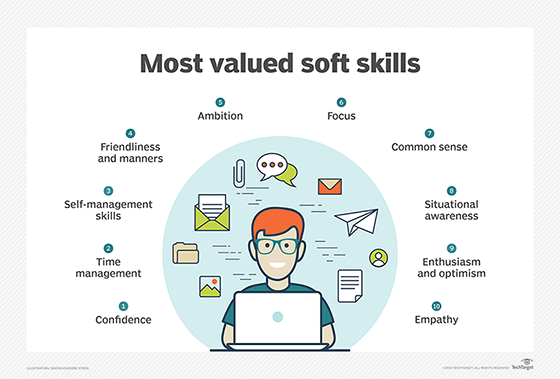
Getty Images/iStockphoto
Top 6 soft skills in IT that cloud teams need
Soft skills play a bigger part in successful cloud deployments than you might think. Technical skills are obviously essential in IT, but a company must hire well-rounded employees.
Soft skills can be critical to a cloud team but hard to learn. A single bad team member can bring down an entire team and project. Also, a lack of soft skills can cause mistakes and delays, which can cost companies a substantial amount of money.
Soft skills are not easy to manage and difficult to train into your staff because people are who they are. You must recognize the skill sets that your staff present to build a successful cloud team.
Look at various soft skills a cloud team needs, as well as how they go hand in hand, including the following:
- Problem-solving.
- Critical thinking.
- Adaptability.
- Agility.
- Collaboration.
- Time management.
Problem-solving and critical thinking
Problem-solving and critical thinking sound similar, but there are key differences:
- Problem-solving. Find a solution to a complex issue.
- Critical thinking. Analyze and evaluate information, experiences and judgements to form a decision.
Problem-solving simply does not have the same investigation phase that critical thinking does, which could include the credibility and relevance of the information. With problem-solving, people break down the issue, evaluate potential solutions and then implement the best strategy. Problem-solving may require certain expertise to solve the issue without critical thinking.
When you frame this into a cloud team, one member might have the extensive experience with cloud tools but may need the critical thinking support on how best to make use of those skills. You often see those critical thinking aspects in IT architects and engineers. Problem-solving is typical in the operational teams.

Adaptability and agility
Adaptability and agility are often used interchangeably. While they may seem similar, they are not:
- Adaptability. The ability to look at all the options, see the big picture and create a plan for a solution.
- Agility. The ability to change when something unexpected occurs.
Many IT architects show more adaptability because they take time to plot out their plan. Operational teams exhibit agility and must make quick decisions in the event of an issue.
In the cloud team, you need these two skills sets to work together. There should be someone to oversee the larger scope and ensure there is a solid plan before the team creates any instances. The agility aspect is key to keep that environment running and adapting to unexpected cloud outages or vendor changes that require swift and deliberate actions.
Adaptability has an extensive cost impact before you typically go live, and agility is to keep you online once deployed.
Collaboration and time management
Collaboration and time management often go hand and hand in respect to saving money:
- Collaboration. The ability to work efficiently with team members to achieve a goal.
- Time management. The ability to proactively plan and prioritize tasks to meet deadlines.
They are related to a degree, but it can be a bit hard for everyone to accept because it involves money and people's feelings. The fact is: Time is money. Poor collaboration can negatively affect a cloud team's time management, which results in higher costs.
Every employee has a cost associated to them. Simply put, some staff get paid a lot more than others. While you can have an architect spin up cloud instances, the cost is high when compared to a junior cloud admin doing the same work. This doesn't mean one person is better than another; it means one person costs more than another.
While it can feel wrong to judge employees around a dollar value, the simple fact is you have to. When you create cloud resources with a provider's environment, not having your people in the right roles with the right skills is just as bad as misallocating cloud resources. While this wasn't a big concern when all the resources were on premises, you're now paying for these external resources.
Additional soft skills
On top of the above intertwined soft skills, IT and cloud team members should also have the following skills:
- Communication. Communicate effectively with team members with active listening, collaboration and engagement in a clear and concise way.
- Creativity. A creative approach to technology can push forward innovation efforts.
- Project management. Plan, set and reach a project goal to exhibit leadership qualities.
- Resourcefulness. The ability to work and solve problems with given resources, as well as seek out what resources are needed, is crucial.
Brian Kirsch, an IT architect and Milwaukee Area Technical College instructor, has been in IT for more than 20 years, holds multiple certifications and sits on the VMware User Group board of directors.








